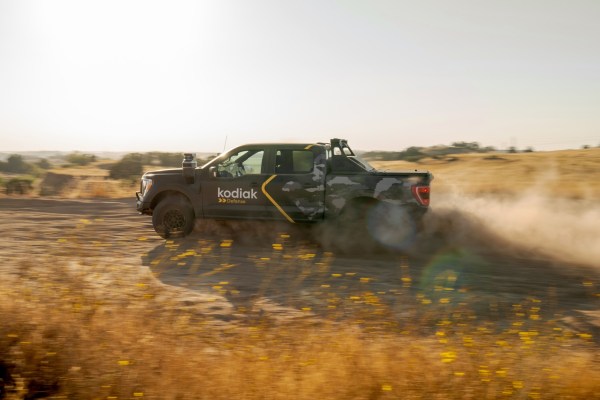
Kodiak Robotics has unveiled its first autonomous evaluate vehicle for the U.S. Department of Defense, a Ford F-150 pickup truck that the startup has upfitted with its software and sensor stack.
The DOD is using the vehicle to evaluate autonomous surveillance and reconnaissance missions in off-road terrain, diverse operational conditions and GPS-challenged environments. Kodiak won the $50 million two-year contract with the Army in December 2022, and now has another year to build and deliver two off-road-capable vehicles based on the F-150. If the pilot is successful, Kodiak could be one of the Army’s future partners as it works to advance autonomous military applications.
“Ultimately, the battlefield of tomorrow is going to be autonomous,” Don Burnette, CEO and co-founder of Kodiak, told TechCrunch. “We want to get men and women out of harm’s way. And this is the technology that’s going to take us into the future of contested environments.”
Most of Kodiak’s go-to-market is centered around commercializing self-driving trucks, but many advanced mobility companies are seeing the military as a quicker path to revenue. The Army has been moving forward with various projects dedicated to autonomous driving, and the Air Force has signed on electric vertical takeoff and landing (eVTOL) companies admire Archer Aviation and Joby Aviation to boost advanced aerial technology in national defense strategies.
As part of its partnership with the DoD, Kodiak is mainly providing the software and sensor suite, and will work with hardware providers on integrating the Kodiak Driver onto a next-gen, purpose-built, ground reconnaissance vehicle, which has not yet been designed or built. Kodiak and the DoD had been toying with the idea of an ATV-style vehicle, but found those to be too small for the use case.
“[ATV-like vehicles] tend to be quite underpowered and they can’t carry both a lot of compute and sensing and people,” Burnette told TechCrunch. “So the F-150 was more size-wise equivalent to the ultimate platform that the Army is going for. And it’s a very capable vehicle.”
The most important thing, from Kodiak’s perspective, is being able to supply a software and sensor stack that can be integrated into multiple different vehicle types and serve a variety of use cases. That’s where Kodiak’s modular, swappable SensorPods come in, which the startup uses on its Class-8 trucks. Kodiak says it adapted its pods for defense applications, and that the so-called DefensePod can be switched out in the field in 10 minutes or less by a technician with no specialized training. It took less than six months for the Kodiak Driver to be installed in a new vehicle, according to the company.
“We developed our autonomous driving system in a way that is conducive and broadly applicable to other environments outside of over the road highway,” said Burnette. “We think that’s a strategic advantage. And we want to take advantage of the fact that our system works in these dual use environments.”

